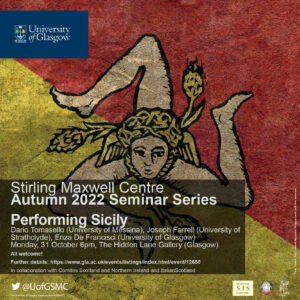On 31 October 2022, the Hidden Lane Gallery in Glasgow welcomed Professor Dario Tomasello from the University of Messina in conversation with Joseph Farrell (University of Strathclyde) and Enza De Francisci (University of Glasgow). Tomasello coordinates the Discipline delle arti, della musica e dello spettacolo (DAMS) at Messina University and has set up the Centro Internazionale sulla Performatività delle Arti e degli Immaginari Sociali. His most recent book includes Playtelling: Performance narrative nell’Italia contemporanea.

The event was generously sponsored by the Society for Italian Studies as well as the Stirling Maxwell Centre and the School of Modern Languages and Cultures, both at the University of Glasgow. We are also grateful to the Italian Cultural Institute in Edinburgh for having invited the guest speaker to Scotland ahead of his lecture at Edinburgh University with Federica Pedriali. With support by the Honorary Consulate of Italy in Glasgow, Italian Scotland, Comites Scozia e Irlanda del Nord, and the Italian Cultural Institute (Edinburgh), the event had a solid base.
Perhaps appropriately, the evening took an improvised turn when Tomasello’s arrival was delayed, and Joe Farrell prepared the way with an improvised survey of moments in Sicilian history and culture. He discussed the varied peoples who from ancient times have held sway in Sicily and who made the island, in Lampedusa’s word, una colonia, and a colony whose landscape carries traces \of magnificent civilisations ‘which are not ours.’ Sicilian Theatre was to be the central theme of the evening, so he spoke briefly of the theatrical interests of the great veristi writers of the nineteen century, of the leading actors of that time – Angelo Musco and Giovanni Grasso – and of often troubled relations of Pirandello with the island of his birth.
These subjects were developed further when the Glasgow taxi service allowed Tomasello to make his appearance. Several chapters in Playtelling examine the disputes surrounding the tradition of the Cunto, specifically debates over its origins in the Middle Ages and revival and reshaping in the 18th/19th century. Tomasello briefly discussed the vastasata as well as Sicilian puppetry, the acting tradition, parallels with, and divergences from, the mainland Italian tradition of performance, the state of contemporary playwriting in Sicily which he judged to be healthy with several writers who deserved to reach a wider internal audience.
The evening was rounded by a Q&A with Enza De Francisci on Tomasello’s own dramatic works. Tomasello has written several plays and has also performed some of his own monologues, an activity which gives him the right to be regarded not only as an academic but as an actor-author in the mainstream Italian tradition. To conclude, Tomasello led a sparkling performance of an intriguing adaptation of Re Artú sull’Etna by Arturo Graf (1984), the retelling of a Sicilian myth on the destiny of King Arthur, who ended up in a splendid cavern in Mount Etna. Translations of the play, performed in a mix of Italian and Sicilian, were provided in handouts by Enza and Michela Calcagni from Comites on the origins of the legend.
